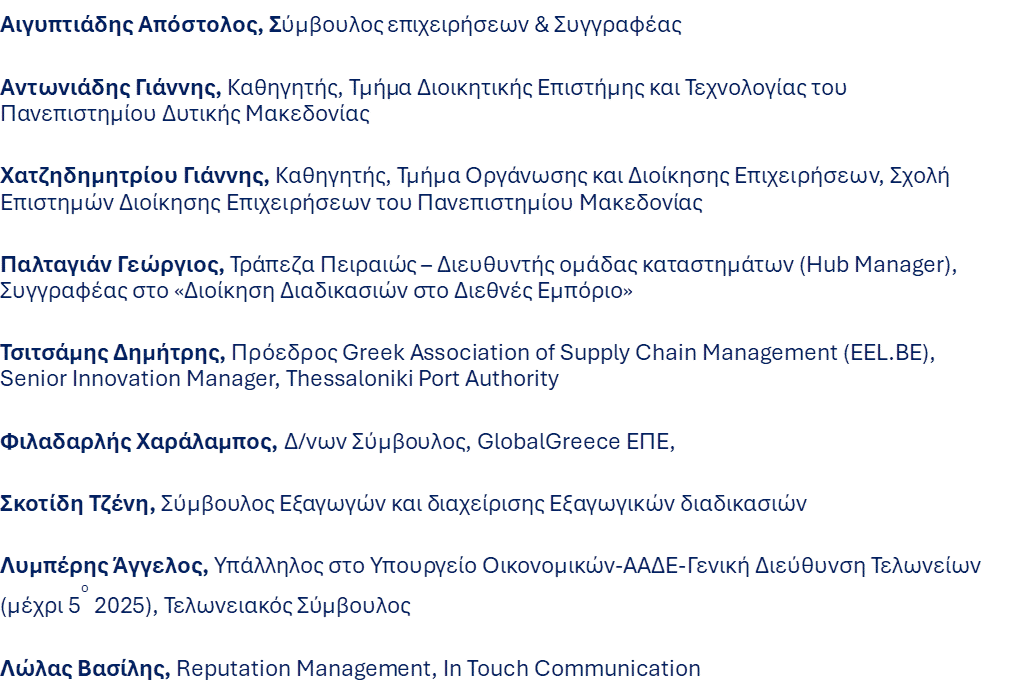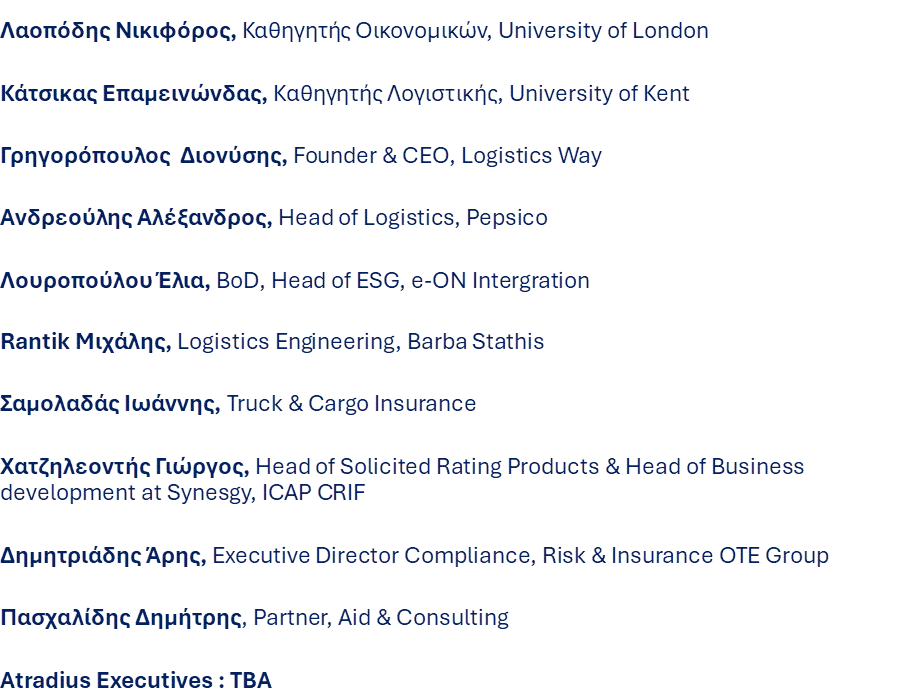Certified International Trade & Risk Management Officer
The “Hellenic Association of Risk Managers” (www.harima.gr) member of FERMA (Federation European of Risk Management Associations, www.ferma.eu) & FECMA (Federation of European Credit Management Associations, www.fecma.eu), with the support of “Academics University of London Worldwide” and SEV and in collaboration with the “Risk Training Institute” of ICAP CRIF, present the “Certified International Trade & Risk Management Officer” training program that leads to the corresponding certification after examinations.
The “Certified International Trade & Risk Management Officer” certification by the “Hellenic Association of Risk Managers” is awarded only to Association’s members and they keep their title as long as they are up to date regarding their membership. The H.A.RI.MA. first year’s registration fee is free of charge for the attendees that successfully graduate from the certificate program.
Description
A Certificate in International Trade Risk Management is crucial in today's global business landscape, where companies face increasing risks and uncertainties when engaging in international trade. Effective risk management in international trade allows businesses to navigate the complex and unpredictable global marketplace and adapt to changing circumstances. By managing trade risk effectively, businesses can seize opportunities, reduce costs, and remain competitive in the global economy.
Import Export Coordinator
Freight Forwarder
Logistics Coordinator
Customs Broker
Global Procurement Director
Supply Chain Director
Trade Compliance Specialist
Export Controls Specialist
Trade Compliance Auditor
Director of International Trade Compliance
Customs Broker (dual compliance role)
Trade Finance Specialist
Trade Finance Analyst
Credit Risk Manager, International Payments
Trade Credit Insurance Underwriter
Letters of Credit Officer
International Sales Representative
Export Manager
Director of International Business Development
Trade Promotion Specialist
Market Entry Strategist
International Trade Negotiator
Trade Policy Analyst
International Trade Economist
Foreign Investment Analyst
Government Trade Officer
International Trade Researcher
Trade Documentation Specialist
International Trade Operations Analyst
Trade Operations Coordinator
Export Controls Documentation Manager
International Trade Data Analyst
Global Trade Solutions Architect
International Trade Software Specialist
International Trade Intelligence Analyst
International Trade Consultant
Intercultural Business Consultant
International Trade Educator or Lecturer
Vocational Training Program Instructor
About
Modules
Export strategy – 10 hours.
Module 1: Foundations of export strategy.
Module 2: Market research and opportunity assessment.
Module 3: Entry modes and strategic positioning.
Company structure to support exports – 9 hours.
Module 1: Foundations of an export focused organization.
Module 2: Leadership and governance.
Module 3: Definition of operational roles and responsibilities.
Module 4: Regulatory compliance and risk management framework.
Module 5: Process design and standard operating procedures.
Module 6: Performance management and KPIs.
Module 7: Technology and systems integration.
Module 8: Change management and culture.
Financial planning – 12 hours.
Module 1: Foundations of trade financial planning.
Module 2: Budgeting and cash flow forecasting.
Module 3: Trade finance products and instruments.
Module 4: Payment terms and risk management.
Module 5: Working capital and export financing.
Module 6: Pricing and reporting for customs and taxes.
Module 8: Practical exercise, full financial plan.
Marketing and digital strategy – 15 hours.
Module 1: Global market assessment.
Module 2: International brand and positioning.
Module 3: Cross border product and pricing strategies.
Module 4: Distribution channels for international reach.
Module 5: Content strategy and localization.
Module 6: Marketing automation and referral management.
Module 7: Analytics and performance measurement.
Module 8: Practical exercise, integrated new market entry.
Logistics and supply chain – 10 hours.
Module 1: Introduction to international supply chains.
Module 2: Strategic planning and sourcing networks.
Module 3: International transport management.
Module 4: Warehousing and inventory management.
Module 5: Customs, compliance and documentation.
Module 6: Logistics technology and digitalization.
Module 7: Risk management, resilience and business continuity.
Module 8: Lean management, sustainability and practical exercise.
Sustainable trade – 9 hours.
Module 1: Foundations of sustainable trade.
Module 2: International environmental frameworks and carbon border tax.
Module 3: Sustainable sourcing and supply chain practices.
Module 4: Circular economy and resource efficiency.
Module 5: Integrating ESG into trade operations.
Module 6: Green logistics and transportation.
Module 7: Sustainable finance and trade instruments.
Module 8: Practical exercise, sustainable trade strategy.
Risk management – 17 hours, part 1 of 2.
| No. | Module | Topics |
|---|---|---|
| 1 | Foundations of Trade Risk | Risk classification, Globalization drivers, Risk management cycle |
| 2 | Country and Political Risk | Stability indicators, Expropriation, Sovereign defaults |
| 3 | Credit Risk & Counterparty Risk | Payment defaults, Trade credit insurance, Credit scoring |
| 4 | Foreign Exchange Risk & Interest Rate Risk | Currency exposures, Hedging with forwards, Options |
| 5 | Trade Finance Instruments | Letters of credit, Guarantees, Documentary collections |
| 6 | Operational Risk & Supply Chain Risk | Supply chain bottlenecks, Port congestion, Force majeure |
Risk management – 17 hours, part 2 of 2.
| No. | Module | Topics |
|---|---|---|
| 7 | Legal Risk & Compliance Risk | Export controls, Sanctions screening, Anti-bribery laws |
| 8 | Insurance & Risk Transfer | Marine cargo insurance, Political risk & transport insurance |
| 9 | Technology & Analytics in Trade Risk | Blockchain letters of credit, AI for risk analysis, Trade technology platforms |
| 10 | ESG & Sustainability in Trade | Green trade finance, Social impact risk |
| 11 | Crisis Management & Resilience Planning | Business continuity plans, Scenario planning, Crisis communications |
| 12 | Capstone Exercise | Comprehensive risk assessment on a real or simulated scenario for a trade deal |
82
Hours Live Online
0%
Skilled and Profesional Lecturers
0+
Ambitious Training Attendes
0+
Years of Experience
0+
Trainings & Certificates

Scientific Associates



